Remembering ‘Mantra,’ One Of The Most Politically Incorrect Comic Books Of All Time
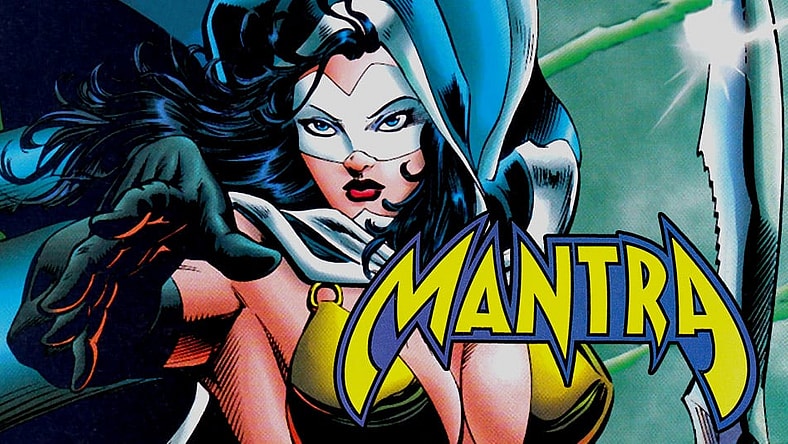
The 1990s is regarded by many a comic book fan as one of the worst periods in the medium’s entire history, and there’s a lot of merit to that claim. Those who lived through the decade were forced to endure a continuous barrage of oddball storylines, climatic crises designed to shock longtime readers without offering a satisfying payoff, and of course, bad character designs and themes. What’s ironic about the 1990s comic book world is the amount of forgotten oddities littered about, one of which is Malibu Comics’ Mantra.
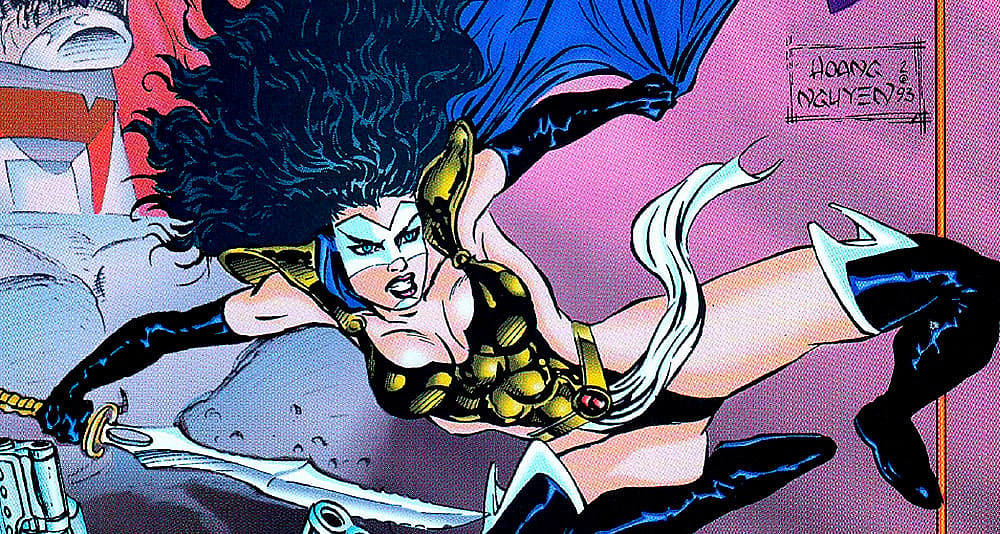
I admit, I never dove into the pages of Mantra during the 1990s, primarily because I lived in a rather small town that wasn’t able to accommodate every comic book fan’s wish list. Therefore, I could only pick up tidbits here and there within the pages of Wizard magazine, and a few other sparse sources. Fast forward exactly thirty years, and I decided to give the entire original series a go.
What’s interesting about Mantra is the subject matter, which by today’s standards feels fairly run of the mill, at least generally speaking. The actual plot isn’t particularly well thought out, and there’s very little exposition to go on, but the overall gist is simple – a warrior named Lukasz has been fighting a centuries-long war against a villain named Boneyard, a sorcerer of great power fighting on behalf of the forces of evil.
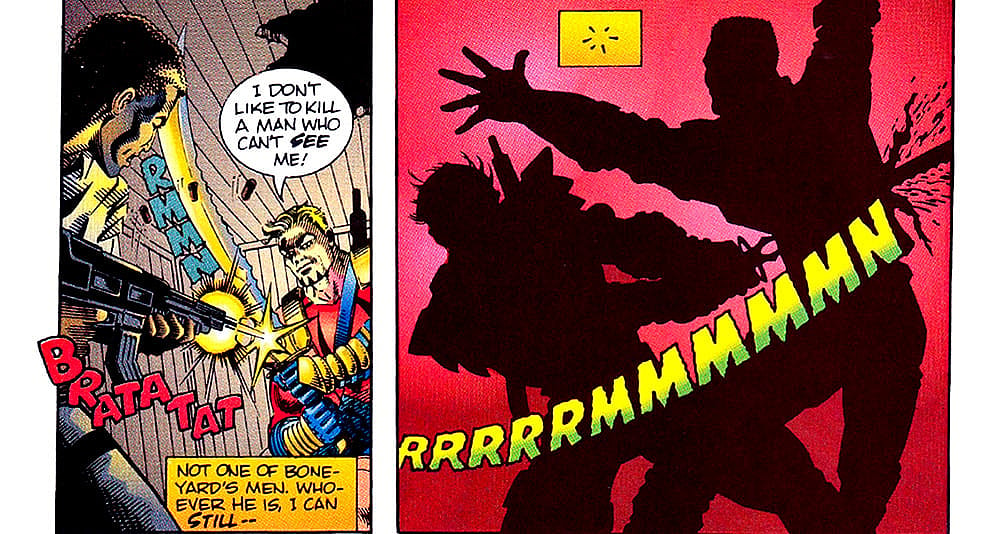
Lukasz and his fellow warriors have been fighting the good fight for ages, each time spiritually inhabiting the body of another person the moment they are killed in battle. As such, Lukasz has lived dozens of lives in a number of different bodies, while displacing their original souls, effectively robbing them of their future. This is accomplished via the magical powers of their de facto leader, Archimage.
However, things change dramatically when Archimage is betrayed by one of his own warriors, and imprisoned by Boneyard. When Lukasz is once again killed in battle, his soul is deposited in another person’s body to continue the fight, presumably for the last time. The trouble is, this final soul transfer lands him in the body of a beautiful woman named Eden Blake, which is where the fun starts.
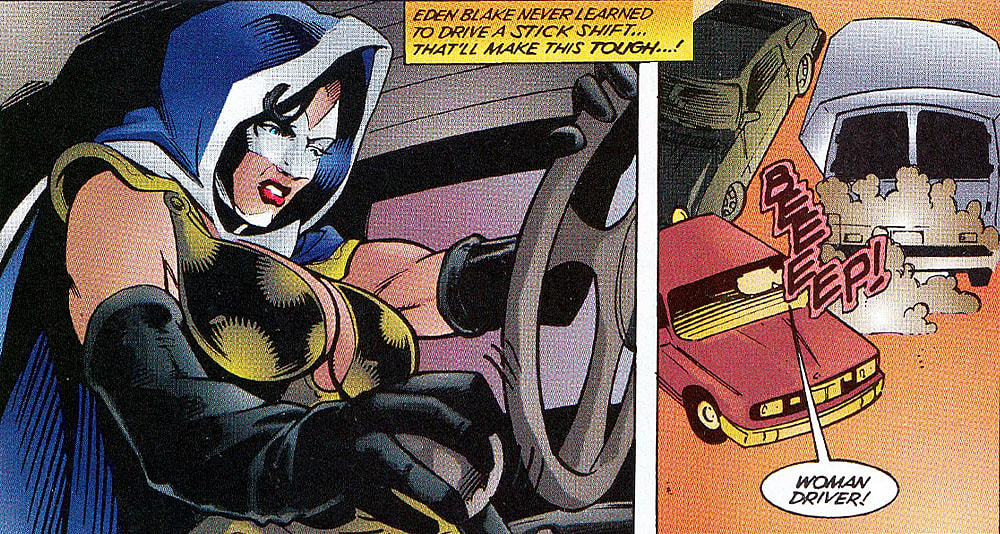
The concept was not exactly novel, especially in the 1990s when films like Switch were playing around with the idea of a man being trapped in a woman’s body. At the time, there was no talk of transgenderism or gender dysphoria. In fact, much like Ellen Barkin’s character in Switch, Lukasz is initially horrified to find that he’s now stuck in a woman’s body, replete with all the benefits and drawbacks of the gender.
As a result, Lukasz spends issue after issue cursing and lamenting the fact that he lacks the same physical strength he had when he was male. He bellyaches about having to walk around in high heels, he loathes his inability to handle certain liquors and black coffee, and he even dreads his first period. The entire concept is rather slapstick, and meant to play on the zaniness of a gender switch that nobody asked for, and nobody wanted.

It’s Mantra’s astonishing and jaw-dropping lack of political correctness that really steals the show, however. In the modern age, this comic would never see a greenlight from a major comics publisher, and it would face a torturous uphill battle of harassment and cancelation campaigns if it managed to set up a crowdfunding page. Mantra is a comic about a man bemoaning the fact that he’s stuck in the body of a woman.
That’s not to say Lukasz doesn’t get to utilize Eden’s body to its fullest potential, however. The entire premise for the whole switcheroo is so Lukasz can harness the power of magic to defeat his foes, after failing to defeat his enemies with science and technology. Eden’s body has dormant powers that Lukasz can tap into in order to fight, which is amplified when he gains possession of a magical mask.
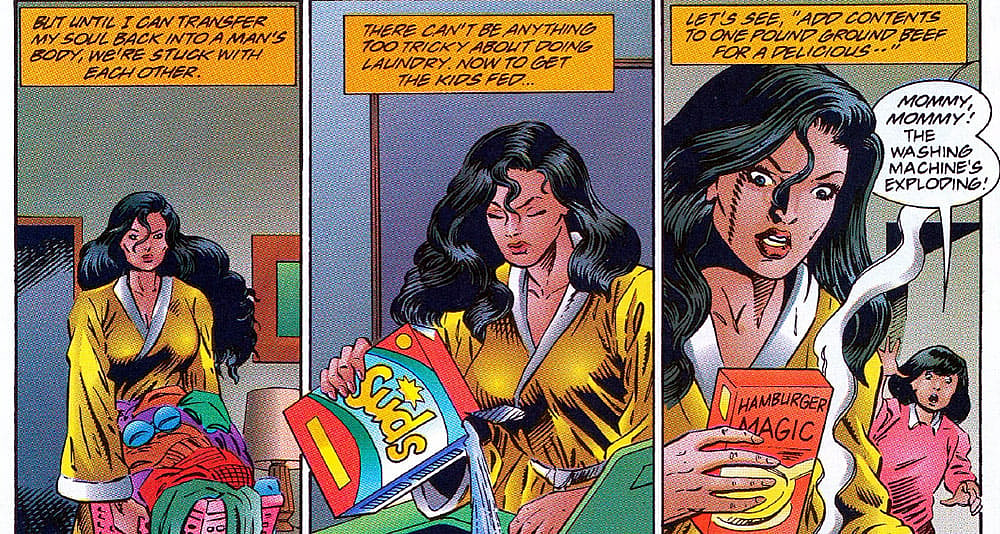
Beyond Eden’s magical abilities, there’s also her inherent sexuality and physical attractiveness, which Lukasz learns to utilize to its fullest potential. Sure, the comic does try to make a statement about the nature of men in society, and how they react to a beautiful woman, some of which bristles with the early DNA strands of Wokeism, and some of which is blatantly obvious to any woman who ever strutted into a room full of men while wearing a leg-slit gown.
It’s Lukasz’s reluctance to embrace what makes Eden who she is that is both funny, and tragic at the same time. Eden is a divorced mother of two children, whose worlds are turned upside down by the sudden and abrupt personality change in their mother. At first, it causes a significant rift between Eden and members of her family, with Lukasz in the driver’s seat hoping to find a way to escape the confines of his female vessel.
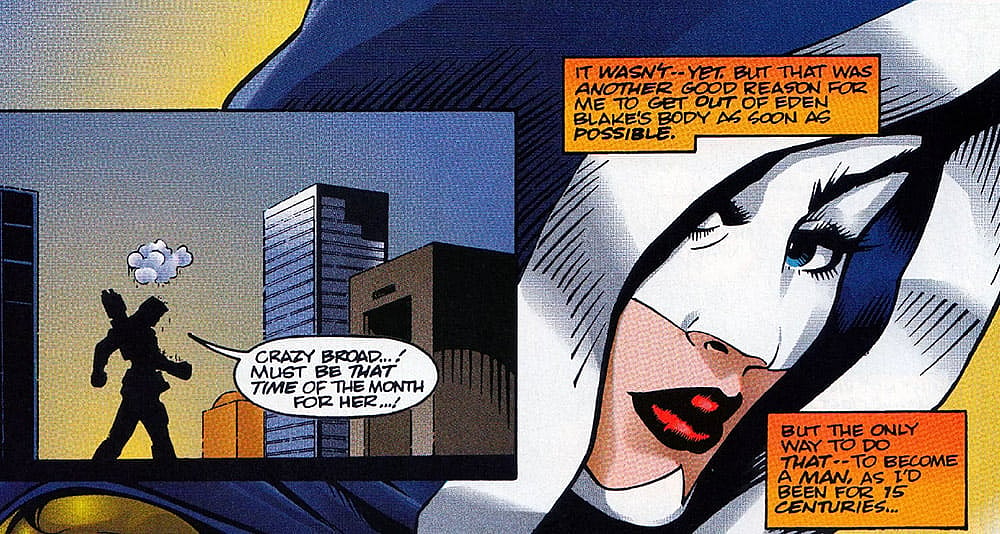
And finally, the comic does play up the hilarity of Lukasz’s plight through one humorous and clever twist – the individual responsible for his last death before landing in Eden’s body is a man named Warstrike, who is eager to get payback on Boneyard’s minions for tricking him into performing the takedown. Warstrike is brash, arrogant and pushy, and though he knows that Lukasz is inhabiting Eden’s body, he’s sexually attracted to that very same body.
Rather than attempt to push the “straight man learns to be gay” motif, Mantra rejects Warstrike’s advances with disgust. He isn’t the only amorous suitor pursuing Lukasz, either. Boneyard himself is keen to enslave and bed Eden’s body for the purpose of fathering offspring that will be able to wield and weaponize magic for his own goals. The way the material is broached is shockingly misogynistic, which was part of the overall joke.
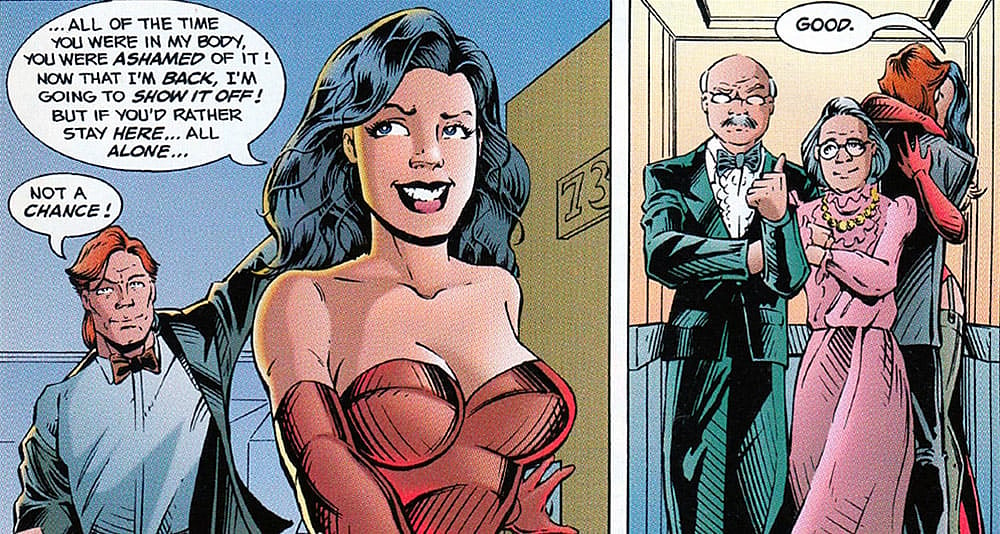
As the comic continues its run, things obviously change, as does Lukasz, but the journey to get there is rife with political incorrectness that deserves a revival in the modern age. At one point, Lukasz learns that Eden’s soul is still very much active inside of the body they both inhabit, and the two fall in love, eventually finding a way to separate, hook up and get pregnant (in one night), only to birth a monstrosity that drives them apart. And it’s all done with an admirable lack of tact, as well as taste.
Combating stereotypes without denying basic reality is Mantra’s strongest theme as a comic book, even if the whole thing is a rather trashy affair. The women aren’t throwing hulking males effortlessly through plate glass windows, or whining about the patriarchy. Rather, there are multiple shades of grey in the themes, which mirrors real life gender roles.
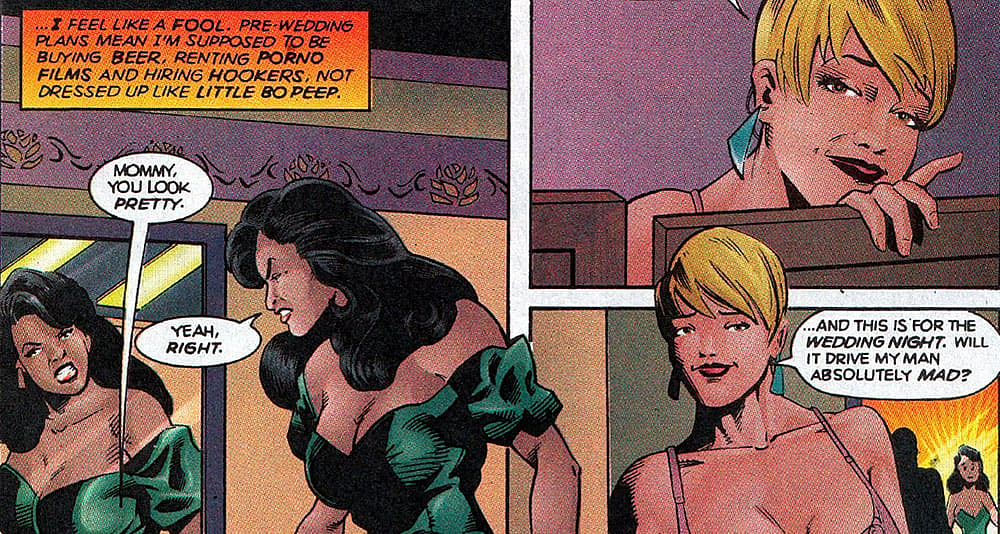
Plus, the comic was a unique offering in an era when the overwhelming majority of fans were males, and females had yet to take an interest in nerdy pop culture. Putting a male hero in the actual shoes of a female was a fun way to ask the “what if” question, and it made for some truly entertaining moments, particularly in issue #9, where Lukasz is forced to endure the agony of being a bridesmaid and participating in the hedonism of a bachelorette party, complete with male strippers.
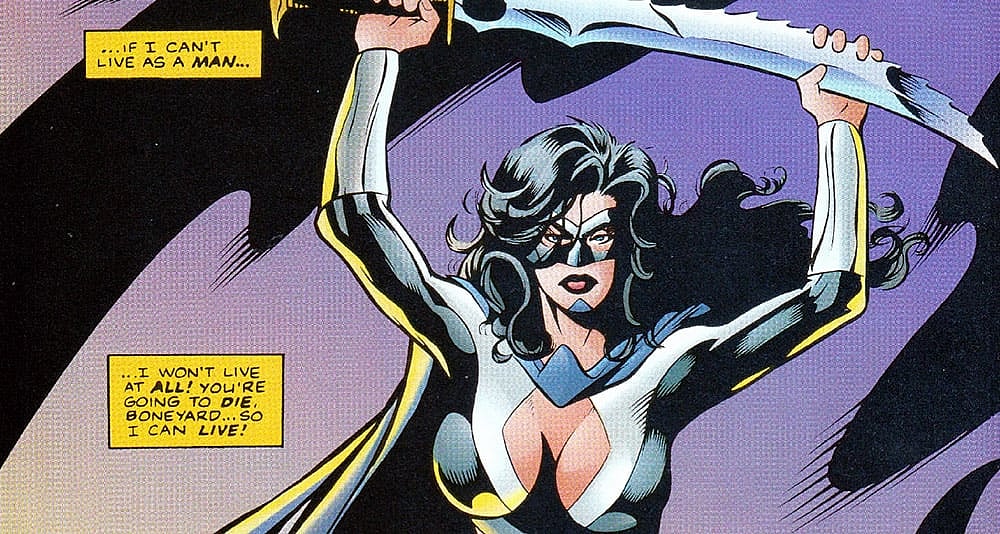
At the end of the day, Mantra was little more than a way to titillate hyper-aroused 14 year old males eager to watch another busty thong-wearing hottie tear up the bad guys, but it did so with a level of self-awareness and uncomfortable jabs at latent homophobia that effectively blended comedy into the mix. Such a comic book would cause Leftist eyeballs to melt out of their sockets in the modern age, which is perhaps the greatest irony of the original comic’s limited 24-issue run.
